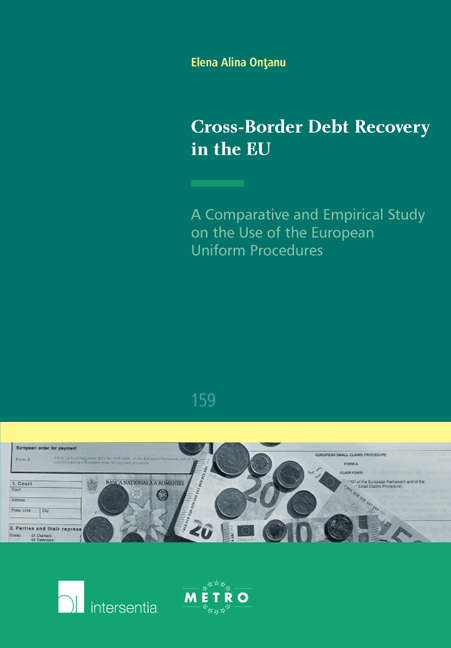 Cross-Border Debt Recovery in the EU
Cross-Border Debt Recovery in the EU Book contents
- Frontmatter
- Acknowledgements
- Contents
- Abbreviations
- Chapter 1 Introduction
- Chapter 2 A European Perspective on the EOP and the ESCP
- Chapter 3 England and Wales
- Chapter 4 France
- Chapter 5 Italy
- Chapter 6 Romania
- Chapter 7 Comparative Perspectives on the Functioning of the EOP and ESCP
- Chapter 8 Conclusions
- Samenvatting
- Annex
- Bibliography
- Table of Cases
- Curriculum Vitae
- Ius Commune Europaeum
Chapter 4 - France
Published online by Cambridge University Press: 11 October 2018
- Frontmatter
- Acknowledgements
- Contents
- Abbreviations
- Chapter 1 Introduction
- Chapter 2 A European Perspective on the EOP and the ESCP
- Chapter 3 England and Wales
- Chapter 4 France
- Chapter 5 Italy
- Chapter 6 Romania
- Chapter 7 Comparative Perspectives on the Functioning of the EOP and ESCP
- Chapter 8 Conclusions
- Samenvatting
- Annex
- Bibliography
- Table of Cases
- Curriculum Vitae
- Ius Commune Europaeum
Summary
Introduction
The French legal system is one of ‘civil law’, a ‘European-continental law’ jurisdiction, relying mainly on codified law. The precedent does not constitute a source of law, but Conseil constitutionnel and Cour de cassation case law have significant authority in the interpretation of legal texts by French judges. Court proceedings in civil and commercial matters in France are carried out according to provisions of the Code of Civil Procedure (Code de procedure civile – CPC) and of the Code of Judiciary Organisation (Code de l'organisation judiciaire – COJ).
This chapter considers the procedural choices creditors have in order to recover debts before French courts, focusing on the special available procedures. The EOP and the ESCP are added to these domestic instruments in cross-border litigation. Section 4.2 offers an overview of the national ordinary procedure and its characteristics, followed in Section 4.3 by a functional analysis of the national special procedures available for the purpose of debt recovery. The characteristics of these national tailored solutions are analysed in comparison to the EOP and the ESCP. Section 4.4 examines the positions of French stakeholders with regard to EOP and ESCP Regulations. Section 4.5 scrutinises the incorporation of EOP and ESCP procedures into the national legislation. The analysis in Section 4.6 focuses on enforcement in France in general and on the execution of EOP and ESCP decisions. Finally, Section 4.7 analyses the functioning in practice of the EOP and the ESCP in accordance with available statistics, published national case law, and the outcome of the empirical research results.
The French Legal System: An Overview
General Aspects
The first instance jurisdiction of civil courts is divided between the main civil court, Tribunal de grande instance (TGI), which is the general first instance court, and the special jurisdiction courts: namely, the Tribunal d'instance (TI), which is competent to hear cases up to a value of €10,000; the jurisdiction de proximité (JP) for small claims up to a level of €4,000; the Tribunal de commerce (TC), criminal courts that trial commercial cases, and the Conseil des Prud'hommes, which handles labour law cases. The JP disappeared as of 1 July 2017.645 Jurisdiction regarding EOP and ESCP cases in France is shared between the TI and the TC in accordance with the civil or commercial nature of the filed claim.
- Type
- Chapter
- Information
- Cross-Border Debt Recovery in the EUA Comparative and Empirical Study on the Use of the European Uniform Procedures, pp. 111 - 190Publisher: IntersentiaPrint publication year: 2017
